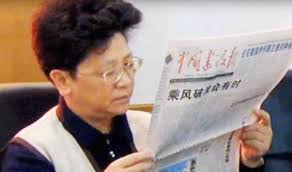17 November 2016
Yang Xiuzhu, 70, a former deputy director of Wenzhou’s construction bureau, has been hiding in the United States for 13 years. Yang was accused of stealing $39 million while in this position. She turned herself in on Wednesday.
In April, last year, China published a list of 100 of its most wanted corruption suspects and she was ranked number one. According to Central Commission for Discipline Inspection she was 37th suspect to return from overseas.
Her brother, former regional official Yang Jinjun, also wanted on corruption charges, was living in United States. He was sent back to China in September 2015, the first-time Beijing succeeded in bringing back a suspect from the United States.
A U.S. State Department spokeswoman said the US was not negotiating an extradition treaty with China. But she added that fugitives could be returned to other countries without an extradition treaty, so long as the extradition is “within the bounds and protections afforded by our Constitution and laws.”
Yang fled China in April 2003 and sought political asylum in France, the Netherlands and the United States. She was held in a detention facility in New Jersey.
Western countries are reluctant to sign extradition treaty with China because they fear that the suspects will be mistreated or punished without due process of the law. They at the same time recognise the menace of corruption if unchecked could erode the economy of the relevant government. China set up Operation Fox Hunt to bring back corrupt officials and business executives who have fled abroad with their assets.
Yang Xiuzhu, 70, a former deputy director of Wenzhou’s construction bureau, has been hiding in the United States for 13 years. Yang was accused of stealing $39 million while in this position. She turned herself in on Wednesday.
In April, last year, China published a list of 100 of its most wanted corruption suspects and she was ranked number one. According to Central Commission for Discipline Inspection she was 37th suspect to return from overseas.
Her brother, former regional official Yang Jinjun, also wanted on corruption charges, was living in United States. He was sent back to China in September 2015, the first-time Beijing succeeded in bringing back a suspect from the United States.
A U.S. State Department spokeswoman said the US was not negotiating an extradition treaty with China. But she added that fugitives could be returned to other countries without an extradition treaty, so long as the extradition is “within the bounds and protections afforded by our Constitution and laws.”
Yang fled China in April 2003 and sought political asylum in France, the Netherlands and the United States. She was held in a detention facility in New Jersey.
Western countries are reluctant to sign extradition treaty with China because they fear that the suspects will be mistreated or punished without due process of the law. They at the same time recognise the menace of corruption if unchecked could erode the economy of the relevant government. China set up Operation Fox Hunt to bring back corrupt officials and business executives who have fled abroad with their assets.















